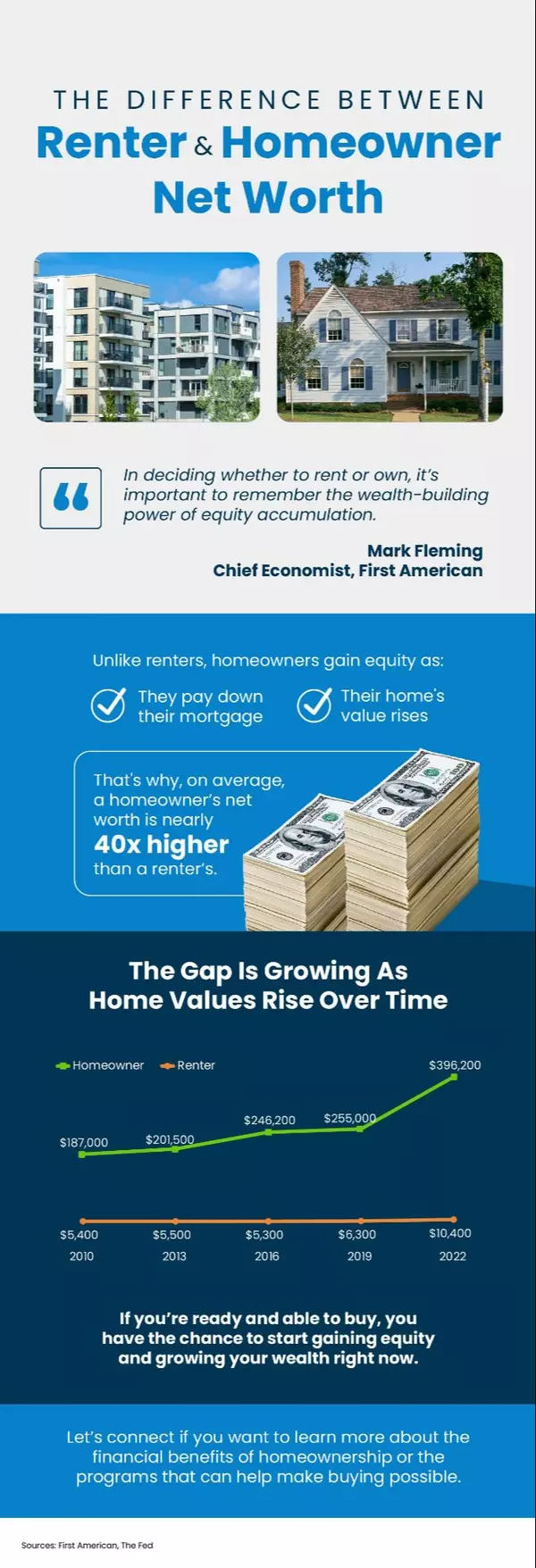
The Big Difference Between Renter and Homeowner Net Worth
The Big Difference Between Renter and Homeowner Net Worth If you’re deciding between renting and buying, remember the wealth-building potential of homeownership. Unlike renters, homeowners build equity through mortgage payments and rising property values. This is why, on average, a homeowner’s net worth is nearly 40 times greater than that of a renter. Let’s connect to explore the financial benefits of homeownership and discuss programs that can help make buying a reality for you.

Should You Sell Your House or Rent It Out?
Should You Sell Your House or Rent It Out? When you're ready to move, deciding what to do with your current home is a significant choice. Today, more homeowners are considering renting out their property instead of selling it. Recent data from Zillow reveals that about two-thirds (66%) of sellers thought about renting their home before listing, with nearly a third (28%) seriously considering it. In comparison, fewer than half (47%) of homeowners considered renting before selling in 2021, indicating a growing trend. So, should you sell your home and use the proceeds toward your next property, or keep it as a rental to build long-term wealth? Let’s explore some key questions to help you determine the best option for your financial and lifestyle goals. Is Your House a Good Fit for Renting? Before making a decision, it’s essential to consider whether your home would be suitable as a rental. For example, if you're relocating far away, handling maintenance could become a significant challenge. Other factors include whether your neighborhood is attractive for rentals and if your home requires major repairs before it’s tenant-ready. If any of these situations apply, selling may be the more practical option. Are You Ready for the Realities of Being a Landlord? Managing a rental property involves more than simply collecting rent each month; it’s a commitment that can be both time-consuming and demanding. For instance, you might receive maintenance requests at any time or encounter damage that needs repair before a new tenant can move in. There’s also the risk of tenants missing payments or breaking their lease, which can introduce unforeseen stress and financial strain. As Redfin points out: “Landlords have to fix things like broken pipes, defunct HVAC systems, and structural damage, among other essential repairs. If you don't have a few thousand dollars on hand to take care of these repairs, you could end up in a bind.” Do You Understand the Costs? If you’re considering renting primarily for passive income, remember, there are additional costs you should anticipate. As an article from Bankrate explains: Mortgage and Property Taxes: You still need to pay these expenses, even if the rent doesn’t cover all of it. Insurance: Landlord insurance typically costs about 25% more than regular home insurance, and it’s necessary to cover damages and injuries. Maintenance and Repairs: Plan to spend at least 1% of the home’s value annually, more if the house is older. Finding a Tenant: This involves advertising costs and potentially paying for background checks. Vacancies: If the property sits empty between tenants, you’ll lose rental income and have to cover the cost of the mortgage until you find a new tenant. Management and HOA Fees: A property manager can ease the burden, but typically charges about 10% of the rent. HOA fees are an additional cost too, if applicable. Bottom Line In summary, deciding whether to sell or rent out your home is a personal choice. Let’s connect so you have a professional by your side to ensure you feel supported and informed throughout the decision-making process.

More Homes, Slower Price Growth – What It Means for You as a Buyer
More Homes, Slower Price Growth – What It Means for You as a Buyer Currently, there are more homes available on the market than we've seen in years—this could be a game changer if you're prepared to buy. Here are two key reasons why. You Have More Options To Choose From An article from Realtor.com outlines how much the inventory of homes for sale has risen this year. “There were 29.2% more homes actively for sale on a typical day in October compared with the same time in 2023, marking the twelfth consecutive month of annual inventory growth and the highest count since December 2019.” Although the number of homes on the market hasn’t fully returned to pre-pandemic levels, this is certainly an improvement (see graph below): With a greater number of homes now on the market, you have more choices available. As Hannah Jones, Senior Economic Research Analyst at Realtor.com, explains: “Though still lower than pre-pandemic, burgeoning home supply means buyers have more options . . .” This gives you a better chance of finding a home that fits your needs. It also means the buying process can feel less rushed, as more options on the market likely reduce competition from other buyers. Home Price Growth Is Slowing When housing inventory is low, buyers face intense competition for the available homes. This was the case a few years back, which led to a rapid rise in prices. However, with more homes now on the market, the pace of home price growth is beginning to slow (see graph below): In some markets, the supply of available homes has not only returned to normal but has even exceeded pre-pandemic levels. In these areas, home price growth has slowed or even come to a halt. As Lance Lambert, Co-Founder of ResiClub, explains: “Generally speaking, housing markets where active inventory has returned to pre-pandemic 2019 levels have seen home price growth soften or even decline outright from their 2022 peak.” Slower or stalled price growth might improve your chances of finding something within your budget. As Dr. Anju Vajja, Deputy Director at the Federal Housing Finance Agency (FHFA), says: “For the third consecutive month U.S. house prices showed little movement . . . relatively flat house prices may improve housing affordability.” But remember, inventory levels and home prices are going to vary by market. Having a real estate agent with local expertise can be a significant asset. They can provide insights into community trends, which can greatly assist you in finding a home that aligns with your needs and budget. Bottom Line A larger selection of homes—and the slower price growth that comes with it—can make it easier to find a property that suits your lifestyle and budget. Don’t hesitate to reach out if you’d like to discuss the expanding options available to you.

What’s Motivating Homeowners To Move Right Now
What’s Motivating Homeowners To Move Right Now In recent years, some homeowners have opted to postpone moving because they’re reluctant to sell and then face a higher mortgage rate on their next home. Perhaps you're considering the same. It’s a common concern and one of the primary reasons housing inventory has remained low for an extended period. However, an increasing number of homeowners are finding they can’t delay their move any longer, often due to personal or lifestyle changes. As Redfin points out: “Some homeowners are opting to bite the bullet and give up their low rate in order to move. Many are selling because a major life event like a job change, or divorce . . .” If you're considering a move, explore some of the top reasons others are deciding to sell. You may find that these reasons resonate with you and make a compelling case for moving now. It’s Time for a Change A new job in another city, the wish to be closer to family, or simply craving a fresh environment can all prompt the decision to sell. For instance, if you’ve received an exciting job offer that involves relocating, putting your current home on the market may be the natural next step. There’s Just Not Enough Space in Your Current House Sometimes, your current home no longer aligns with your lifestyle. A growing family, the need for a dedicated home office, or more space for entertaining can all motivate an upgrade to a larger home. For example, if you’re living in a condo and expecting a baby, selling could be the right choice to find a more spacious home that better suits your evolving needs. Retirement or Wanting To Downsize On the other hand, some homeowners are looking to downsize. This may be due to children leaving home, entering retirement, or the desire for less upkeep. For instance, if you’ve recently retired and are envisioning a more streamlined lifestyle, moving to a smaller home could free up both time and resources, allowing you to fully enjoy this new phase of life. Changes in Relationship Status Major life changes, such as divorce, separation, or marriage, often create a need for different living arrangements. For example, if you've recently gone through a divorce, selling the home you once shared could help both of you move forward and find a living situation that better suits your current needs. Health and Mobility Needs Health concerns, particularly those impacting mobility, can also prompt the choice to sell. A home that once met your needs may no longer be suitable. If this resonates with you, selling your current home to move into a more accessible space—or using the proceeds to transition into assisted living—could greatly enhance your quality of life. Bottom Line Selling your home involves more than just considering market conditions or mortgage rates—it’s about making the right choice for your lifestyle and future. As Bankrate puts it: “Deciding whether it’s the right time to sell your home is a very personal choice. There are numerous important questions to consider, both financial and lifestyle-based . . . Your future plans and goals should be a significant part of the equation.” If a significant life change has you considering a move, now could still be an ideal time to sell. Let’s connect so you have a trusted expert to guide you through the process.
Categories
Recent Posts










